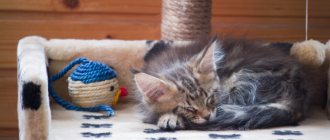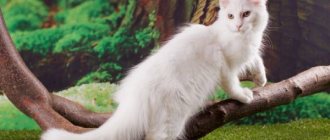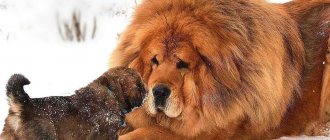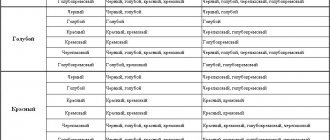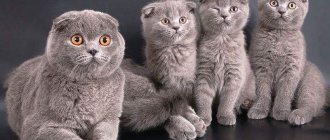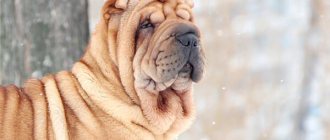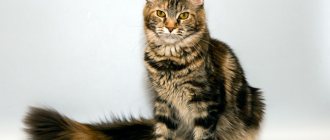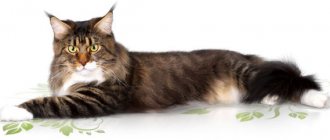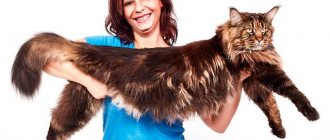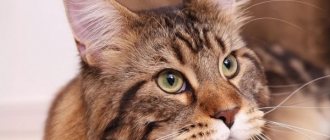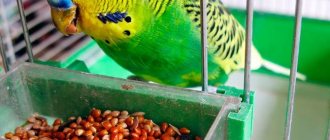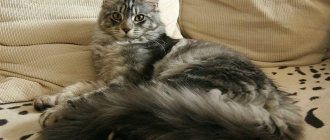The Maine Coon is very popular today. Its main differences from other breeds are its large size and weight. The main condition for the good appearance and health of your beloved pet is proper and balanced nutrition. Given the size of the pet, a special diet and regime is required that must be followed, so the question of what to feed the Maine Coon is very important for owners.
Natural nutrition.
What to feed a Maine Coon?
The food of a domestic cat can be divided into three types:
- industrial feed
- food made from natural ingredients
- mixed nutrition.
Let's look at each one separately to understand which one is best for your pet.
Dry food for Maine Coon contains the optimal ratio of vitamins, minerals and trace elements that will help the cat develop correctly. However, you should buy good quality food , but it is quite expensive. However, the shelf life of opened packaging is limited. In appearance, it seems that the Maine Coon eats a lot, but this is not so, its stomach is actually small. The packaging always indicates the number of grams per serving, which must be adhered to.
You can also give your cat natural food. Many pets enjoy eating food prepared by their owner. You should only take into account that in addition to meat and fish dishes, you must add porridge, vegetables, bran and vegetable oil. Introduce fermented milk products into your diet once a week for better digestion.
Maintain the correct ratio of the amount of food your Maine Coon eats to the animal’s body weight: 30 grams per 1 kg of the cat’s weight. Do not overfeed your pet with high-calorie food; the recommended daily calorie intake is 300 kcal for cats and 250 kcal for cats.
If you choose a mixed type, then do not feed natural food and industrial food at the same time. It's better to alternate days.
Industrial feed
The group of industrial cat foods includes all factory-produced mixtures. Unlike feeding a Maine Coon with natural food, here the owner does not have to independently calculate the biological value of the products.
Manufacturers offer two types of industrial feed: dry granules of various sizes and wet canned mixtures. Both the first and second options are suitable for feeding all Maine Coons.
Rules for choosing industrial food for Maine Coon
When choosing industrial food for your Maine Coon, you need to consider the following criteria:
- Dry or wet. Experts advise feeding Maine Coon kittens wet formulas. Dry formulas are included in the diet at older ages.
- Feed category and manufacturer brand. There are 4 classes in total - from budget economy to holistic. In the first case, we are talking about the cheapest feed based on “recycled” meat. Whether it is correct to feed them to a purebred Maine Coon is something the owner of the animal must decide.
- Composition and additives. All mixtures, both dry and wet, are available with different compositions. The presence of certain ingredients depends on the type of cat the food is intended for. For example, some manufacturers produce mixtures for individual breeds, taking into account characteristic diseases. In this case, you need to take the advice of a veterinarian before choosing how best to feed your Maine Coon.
What food is best for Maine Coon?
If we put aside the issue of cost, in which the cheapest and therefore lowest-quality product will always win, all that remains is to study the composition of the components, which is described on the packaging.
Economy category food contains many substitutes, dyes, preservatives and fillers. Even the nutritional value of such mixtures has traditionally been questioned, and their impact on health and life expectancy is not discussed at all. In any case, economy class products are not what you can feed your Maine Coon.
Premium and superpremium foods are made from high-quality products; they usually differ only in the composition of the fillers. The former contain more preservatives or flavorings and lower protein content.
The holistic group is one of the most expensive industrial mixtures for cats. In them, artificial preservatives are replaced with natural ones, there are very few grains, and the composition is as close as possible to the quality of natural food.
Important! It is not recommended to mix industrial feed of different brands. Each manufacturer adheres to its own system for counting useful components, and simultaneous feeding reduces the effectiveness of the calculated balance.
Amount of food
It has been noted that genetically representatives of this breed are prone to obesity, therefore the Maine Coon should be fed in such a way as to prevent overeating. If we take the daily norm at the rate of 30 grams per 1 kg of animal weight, as noted earlier, then 250 grams of food for an adult cat will be enough for a day . This amount can be divided into 2-3 doses.
The amount of food per day for a Maine Coon is recommended by veterinarians and you should not indulge a pet that asks for a snack when the owners sit down at the table. Develop a habit for yourself and your cat that the food bowl should only appear during feeding time.
Do not leave uneaten food; if there is any left, remove and wash the bowl. The only exceptions are water and fermented milk drinks. Water should be available to the cat at all times.
Kitten nutrition
Proper nutrition for a Maine Coon begins from infancy. Until about 2 months, the kitten feeds on its mother's milk. Then the diet becomes complete, but appropriate to the age of the kitten. A Maine Coon at 3 months old eats 5-6 times a day in small portions. Then the number of feedings gradually decreases, and the portion increases slightly. By the age of one year it is already a large teenager and can eat 2-3 times a day.
The baby can be fed with special food or natural food prepared independently. It is important that in the second case only fresh ingredients are used. Dry food for a Maine Coon kitten must be soaked in a small amount of water .
You can purchase a digital scale for your growing Maine Coon cat. With proper nutrition, a female individual gains approximately 400-600 grams per month, and a male individual gains up to 1 kg. If the numbers are higher, then the diet should be revised towards lower calorie content.
Additionally
Vitamins - specialized, preferably with the addition of calcium and taurine.
Chondroprotectors for bones and joints are a must! Likes: Beaphar Junior Cal; Beaphar Irish Cal; Anivital CaniAgil AniVital CaniAgil. There is a wide choice on the market, just read on the Internet, but be sure to add medications for bones and joints to the diet of a growing Maine Coon.
Sometimes your favorite Maine Coon may ask for something from your table. It could be a piece of sausage or cheese, milk porridge or dumpling. For example, I have a cat who really loves baked goods and fresh bread. Do not deny him this little pleasure, which will increase many times over if you let him lick your plate.
If you decide to switch completely to natural feeding, do not do it suddenly. Everything is gradual. And remember, with natural feeding (without adding dry food), a complex of vitamins is required: a complex of vitamins and minerals, namely: calcium preparations, vitamins for wool, B vitamins, ascorbic acid, taurine, essential unsaturated fatty amino acids Omega-3 and Omega-6, microelements.
A common type of natural food, the so-called “Kun porridge”, is one of the recipes:
1 kg. chicken neck, 100 g chicken liver, 100 g. chicken stomachs, 100 gr. chicken hearts, 400 g beef, 400 g. chicken breast, large carrots, half a bunch of lettuce, 10 per. eggs
Grind everything coarsely in a meat grinder or chop finely, mix, divide into portions and place in the freezer. You can feed breakfast and dinner three times. Add vitamins, protectors, vetom to the “porridge” - everything that is needed for the normal growth of the Maine Coon.
Simple rules
Breeders of these beautiful and big cats need to remember a few simple tips from veterinarians:
- never exceed the amount of food for your Maine Coon per day, then he will always be active and playful. Overeating will lead to obesity, which, in turn, threatens diseases and decreased tone.
- Proper nutrition for a Maine Coon contains the optimal ratio of fats, proteins, carbohydrates, vitamins and minerals. Only this will help your pet stay healthy. A good coat appearance may be an indicator. If the hair falls out a lot, in clumps, and in long-haired cats this is very noticeable, then something is clearly missing. This can be easily corrected by adjusting your diet.
- The feeding diet of a Maine Coon cat can consist of both industrial food and natural food and an unlimited amount of water.
Follow all the tips and your cat will delight you with its healthy appearance, excellent mood and well-being, beautiful fur and gentle purring!
Kitten diet
For proper growth and development, a kitten requires a balanced diet, including all the components necessary for health. In the first few weeks, the kitten eats only mother's milk, but already at the end of the first month of life it is necessary to introduce complementary foods, and then decide what type of food will be used when feeding the animal: natural products or ready-made food.
Dry food
The main advantage of industrial feed is its balanced composition, containing nutrients, vitamins, macro and microelements necessary for the growth and development of a kitten. It is better to give preference to food designed specifically for kittens of this breed, since their composition, as well as the size and shape of the granules, are designed taking into account all the characteristics of Maine Coons. Such foods include, for example: Royal Canin Kitten Maine Coon and Bosch Sanabell kitten.
The food should be soaked first, as it is difficult for kittens to chew through hard granules.
Regular food, feeding table by month
If for some reason breastfeeding is not possible, a substitute should be used.
Absolutely forbidden
A kitten's diet should not include:
- pork and other fatty meats - have a negative effect on the liver, can lead to vomiting and diarrhea, and without heat treatment can become a source of infection with worms;
- potatoes - this product contains a high content of starch, which is not digestible by the coon body;
- legumes - lead to bloating and flatulence;
- nuts - contain phosphorus, their consumption can lead to calcium loss, hematopoietic disorders, liver and kidney diseases;
- mushrooms – hard to digest, toxic;
- tomatoes and eggplants - contain alkaloids, which leads to stomach pain;
- onions and garlic - contain disulfides and destroy leukocytes;
- avocado – the persin it contains is toxic to the stomach and intestines;
- chocolate – due to theobromine content, it disrupts the functioning of the heart;
- tea, coffee are harmful to the nervous system;
- pasta – leads to gastrointestinal colic;
- flour – provokes bloating and diarrhea;
- sweets – harm cats’ teeth and lead to obesity;
- pickles - can lead to electrolyte imbalance;
- bones - can damage the digestive organs.
It is forbidden to feed the Maine Coon with food from the common table.
Daily feeding rates depending on the kitten’s weight
Maine Coons weigh almost 2 times more than other cats.
Therefore, average food consumption rates and methods for calculating them are not relevant for them.
The daily volume of food consumed by the Maine Coon should be approximately 10% of its weight, and for each kg of weight there should be 60 kilocalories and 10 g of protein.
Therefore, the best option for determining the daily diet is to weigh your pet.
Maine Coon kittens have a good appetite and constantly need to replenish expended energy through food. It is important to take this into account when compiling an animal’s daily menu, since unbalanced nutrition and overfeeding are equally dangerous for it.
Food should compensate for energy costs through quality, not quantity.
General recommendations
It is important for a large cat to consume the amount of food necessary for its growth. Maine Coons are known for their large size: an adult cat weighs up to 10 kilograms
Maine Coons are known for their large size: an adult cat weighs up to 10 kilograms
Basic rules for feeding Maine Coons:
- The main part of the diet should be meat.
- Industrial feeds of at least premium category are suitable.
If your pet lives in an apartment and does not have access to the street, it is worth planting grass specifically for it to cleanse the gastrointestinal tract of hair.
Healthy eating rules
There are two basic rules for healthy eating:
- Calculation of calories, weight, nutritional value of foods necessary for the growth of a Maine Coon.
- Elimination of harmful products.
To avoid underweight or overweight, you need to determine the required proportions depending on the age and weight of the pet. On average, the calorie content of food per day should be 600 calories, the amount of protein in it should be 10 g.
To avoid underweight or overweight, you need to determine the required proportions depending on the age and weight of the pet.
If the cat is of medium size, they count on 250 g of food per day. As you grow, the norm changes. 100 g of food normally contains 300-400 calories, 40% protein, 30% fat and 2% fiber.
What is mandatory excluded from the diet of all cat breeds:
- Chicken and fish bones.
- Duck, pork.
- Smoked, spicy.
- Sugar, sweets, especially chocolate.
- Potatoes, starch-containing products.
- Salt.
- Vitamins intended for humans.
Natural nutrition
For animal health, they choose not only special balanced feeds, but also natural products.
What is preferable to give:
- Raw beef.
- Boiled chicken.
- By-products, but not often.
- Liver.
- Chicken yolk – no more than once a week.
- Milk (only up to 3 months of age).
- Natural kefir, cheese, yoghurts.
- Fresh homemade cottage cheese.
- Cereals.
- Greens to cleanse the stomach.
- Cat vitamins.
Dry and wet food
Special dry food is a comfortable alternative to natural food: it saves purchasing and preparation time, and it is easier to maintain the dosage.
They purchase food depending on their age and health status. There are special products for kittens, since the growing body needs a different set of elements. The same applies to castrated cats.
There should be a note “for the prevention of urolithiasis.” Wet food should not be left out in the open air in your cat's feeder. The portion that the animal will eat is immediately separated.
Adults
Adult cats need to be fed twice a day - morning and evening. In some cases, you can keep the food bowl always full so that your coon can eat when he wants. This is only permissible if the diet is based on ready-made food and the pet does not have a tendency to overeat.
Natural nutrition
The daily diet of Maine Coons with natural feeding should include:
- meat – raw, pre-frozen or scalded veal or beef, boiled chicken, boiled beef and chicken offal;
- fish - only sea or ocean fish and no more than 2 times a week, because it contains salts, which provokes the formation of kidney stones;
- cereals – buckwheat, rice, oatmeal;
- eggs (yolks) – 2 times a week, boiled, preferably quail, but chicken are also acceptable;
- vegetables - boiled or raw carrots, pumpkin, zucchini, cauliflower;
- vegetable fats – have a beneficial effect on the heart, blood vessels and bones;
- dairy products;
- greens - wheat, oats, barley specially sprouted for the cat.
Dairy products include small amounts of butter, low-fat cream, cheese and natural yogurt.
Drinking milk in its pure form is prohibited as it leads to indigestion.
Many owners cook a special mixture for their pets, called “kunya porridge”.
It consists of 80% meat and offal (beef, chicken breasts, turkey, rabbit, heart, chicken liver, necks, heads, stomachs, backs, turkey stomachs, beef tripe, lung), as well as vegetables, vegetable oil and dairy products .
One of the recipes for “marten porridge”:
- 1 kg chicken breasts;
- 1 kg pork or chicken heart;
- chicken liver;
- vegetables;
- olive oil.
- add chicken necks, kelp and cottage cheese before serving.
A natural diet involves additional consumption of vitamin and mineral complexes by Maine Coon. These can be multivitamins (Cat VitaminTabs, Beaphar, Polidex) or a complex aimed at maintaining the health of the musculoskeletal system (Cat Mineral Tabs, Velox Gelenk Energie).
Vitamins are prescribed by a veterinarian after examining the animal and conducting biochemical tests.
Stern
Feeding Maine Coons with industrial food allows cat owners to save time on preparing food for their pets and avoid the need to study information about creating a balanced diet. In addition, such food has a long shelf life, it is convenient to take it with you when traveling, and the daily feeding rate is indicated on the package.
Ready-made food comes in several classes:
The division into classes is associated with the different quality of ingredients used in the manufacture of the product.
Natural products
First, you need to consider all the foods that should be included in the Maine Coon diet.
- Beef, chicken or rabbit. It should make up 2/3 of the total diet.
- Sea fish must be deboned. It should be given 1-2 times a week.
- Fruits and vegetables should be included in a cat's diet every day.
- Cereals should make up 1/5 of the diet. It can be rice, semolina, or buckwheat.
- Chicken yolks should be given 2 times a week.
- Minerals and vitamins.
- Sprouted herbs, such as wheat or oats.
Industrial feed can be either dry or wet. Both types are very beneficial for Maine Coons.
Dry food
Premium food is best suited for Maine Coons. They are created under the influence of very high temperatures and pressure. In addition to meat, other components are added to them. Besides this, they:
- practical to use;
- perfectly stored;
- have a low price;
- quite high in calories;
- They perfectly massage the gums of their pets.
Wet food
It is considered the second and main food for Maine Coons. In addition, it can have different textures. This:
- mousses;
- fish pastes;
- meat pates;
- various nuggets.
They all have many advantages:
- go better with natural foods;
- perfectly preserved;
- everything is eaten almost at once;
- they are balanced;
- they contain a sufficient amount of liquid.
However, such feeds also have some disadvantages. It often happens that pets overeat them. They are not always able to control themselves, so they need to be monitored, giving no more than the prescribed norm.
For nursing cats
In the first month of life, kittens receive proteins, fats, carbohydrates and other elements necessary for growth and development from their mother’s milk, so the cat’s diet must be composed of foods containing high amounts of these components. The menu should also include bone meal (1 tsp daily) and fish oil (once a week). The portion size should be increased by 3 - 4 times, and the frequency of feedings should be increased to 5 - 6 times a day.
To ensure good lactation, one third of the menu should consist of dairy products.
Pregnant cats
If a cat's diet is based on industrial food, then during pregnancy it should not be switched to natural products. You just need to purchase food designed specifically for pregnant and lactating cats, the composition of which is designed taking into account all the body needs of the future mother and kittens. If the animal’s diet consisted of natural products, some changes must be made to the menu by excluding fish, beets and cabbage from it to minimize the load on the kidneys and the likelihood of intestinal upset and adding milk.
At the beginning of pregnancy, you need to feed your pet twice a day, slightly increasing the usual serving size, in the middle - three times, doubling the amount of food, and before giving birth, increase the number of feedings to 6 times a day.
After consulting with a veterinarian, you should additionally give your cat a vitamin and mineral complex.
Veterinarian advice
When feeding Maine Coons you should follow several rules:
- Do not mix natural products and industrial feeds;
- food should be warm - cold or hot food has a negative effect on the animal’s digestive system;
- products must be fresh and of high quality;
- it is necessary to follow the feeding regime;
- Maine Coon must have free access to clean drinking water;
- a balanced menu should consist of 40% proteins, 20 - 30% fats and at least 2% fiber.
If there is a need to switch your pet from dry food to natural products, this must be done gradually: first mix dry food with canned food from the same manufacturer, then gradually introduce natural products. When changing the type of food, a restructuring of the Maine Coon’s digestive system occurs, so you need to give the cat a bifidobacteria complex.
Drinking water
Many cat owners mistakenly believe that their animals get enough moisture from their food. In fact, your cat needs to have 24/7 access to fresh water.
Lack of fluid provokes the development of serious pathologies, such as impaired renal function and a disorder of water balance in the body. The amount of water a Maine Coon should drink depends on the animal's diet. A cat eating dry food needs to replenish 250-300% of moisture, and natural vegetable or meat puree already contains liquid, but drinking is still necessary (at least 50% of the food weight).
How to feed a Maine Coon
Owners of Maine cats know that cats have a small stomach, so feeding them three times a day is best. At the same time, a healthy cat should consume about 250 kcal per day, and a normally developed cat should consume approximately 300 kcal. On average, about 30 g of food will be required per kilogram of weight. When a coon reaches its adult size, it eats about one and a half times more than a normal cat.
How to properly organize a cat’s nutrition in order to maintain the health and good-natured character of a coon for a long time? It is necessary to ensure that food is as rich in nutrients, microelements and vitamins as possible. Although the majority of Maine Coons have excellent health, you should not feed them from the common table.
Today there are three types of food available for cats:
- prepared feed;
- home-cooked food;
- mixed type of food.
It's in the bowl!
It also happens: the cat has no complaints about the food itself, but the bowl causes discomfort. And there may be several reasons for this. The bowl may be too deep or too shallow, it may not be clean enough, or it may be made of a porous material that has absorbed the smells of the previous dinner or some completely foreign odors. There are also materials that enter into a chemical reaction with certain substances, causing an unpleasant taste. For example, certain types of medicated food become bitter in metal containers. And there are materials that in themselves are unpleasant for the cat. In addition, the bowl may be inconvenient and small, so the Maine Coon’s whiskers touch the sides of the bowl when he eats. Since a cat's whiskers are very sensitive, this can irritate your Maine Coon. So if you suspect this is the reason, try replacing the bowl with a wider and shallower one.
How much does baby kun eat?
When the little baby is still very small, its feeding is more frequent and has a special selection of food. Kittens up to 4 months need to be fed 5-6 times a day. It is necessary to ensure that special food for kittens is used to feed babies. You can add boiled chicken fillet, oatmeal with milk, cottage cheese, meat baby food, and egg yolk to your food. If you have a kitten, be sure to ensure the availability of fresh drinking water.
For older animals, the number of feedings is reduced. From 6 months, a young coon can be fed 2-3 times a day. It is better not to feed the cat immediately after waking up, as this can teach the animal to arrange early wake-ups for the whole family. If the owner works close to home, then it is convenient to arrange two feedings a day:
- morning, before leaving for work;
- evening - 2 hours after your return, around 20 pm.
When food isn't good for you
Maine Coons are a breed of cat that arose in the harsh farming conditions of the northern United States. As a result of natural selection, only the hardiest cats with good and healthy instincts remained. Now coons live in city apartments, where their mouse-catching abilities are not in demand, but their healthy appetite and great mobility prevent excessive overeating and obesity.
Interesting! Maine Coons were first officially recognized in 1878, although the first surge in the popularity of big cats occurred after the 1861 exhibition in New York.
A healthy Maine Coon correctly determines how much it should eat. However, if a neutered animal lives in your house, you need to be a little more careful about feeding it and not overfeed. Due to changed hormonal levels, the animal becomes calmer and may gain excess weight, leading to health problems.
Neutered cats have a significantly increased risk of urolithiasis. To prevent the formation of kidney stones, you should choose food containing reduced amounts of magnesium and phosphorus. Many pet food manufacturers have corresponding lines for sterilized cats.
